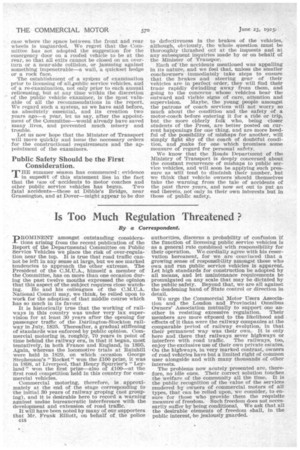Is Too Much Regulation Threatened ?
Page 2

If you've noticed an error in this article please click here to report it so we can fix it.
By a Correspondent.
PROMINENT amongst outstanding considerations arising from the recent publication of the Report of the Departmental Committee on Public Service Vehicles we place the risk of over-regulation near the top. It is true that road traffic cannot be left in any sense at large, but we see marked tendencies to approach the other extreme. The President of the C.M.U.A., himself a member of the Committee, has on more than one occasion during the past twelve months expressed the opinion that this aspect of the subject requires close watching. He and his colleagues of the C.M.U.A. :National Council may, we think, be relied upon to work for the adoption of that middle course which has so much in its favour. It is historically true that the working of railways in this country was under very lax supervision for at least 30 years after the opening for passenger traffic of the Darlington-Stockton railway in July, 1825. Thereafter, a gradual stiffening of standards was enforced by public opinion. Commercial motoring is, roughly, 70 years in point of time behind the railway era, in that it began, most tentatively, in both France and England, in 1895. Again, whereas the locomotive trials at Rainhill were held in 1829, on which occasion George Stephenson's " Rocket " won the £100 prize, it was in 1898, at Liverpool, that Henry Spurrier's " Leyland '? won the first prize—also of £100—at the first road competition held in this country for commercial vehicles. Commercial motoring, therefore, is approximately at the end of the stage corresponding to the initial 30 years of railway groping (not grouping), and it is desirable here to record a warning against undue bureaucratic interference with the development and extension of road traffic. It will have been noted by many of our supporters that Mr. Frank Elliott, on behalf of the police c18 authorities, discerns a probability of confusion if the function of licensing public service vehicles is as a general rule combined with responsibility for their operation. We cordially agree with his reservation hereanent, for we are convinced that a growing sense of responsibility amongst those who own and run public service vehicles is apparent. Let high standards for construction be adopted by all means, and let maintenance requirements be promulgated on any scale that may be dictated by the public safety. Beyond that, we are all against the deadening hand of State control or direction in detail. We urge the Commercial Motor Users Association and the London and Provincial Omnibus Owners' Association mutually to support one another in resisting excessive regulation. Their members are more exposed to the likelihood and effects of it than were the railway companies at the comparable period of railway evolntion, in that their permanent way was their own. It is only here and there that railways sever highways or interfere with road traffic. The railways, too, enjoy the exclusive use of their own private estates. On the highways, in very marked contrast, owners of road vehicles have but a limited right of common user alongside and with many thousands of other interests. The problems now acutely presented are, therefore, no idle ones. Their correct solution touches the welfare of the community all the time. It is the public recognition of the value of the services rendered by owners of commercial motors of all types, that ('an be relied upon, we consider, to ensure for those who provide them the requisite measure of freedom. Such freedom does not necessarily suffer by being conditional. We ask that all the desirable elements of freedom shall, in the public interest, be jealously guarded.






























